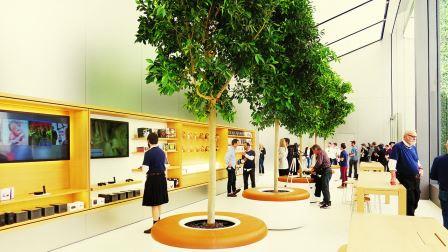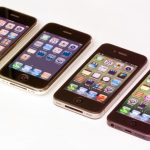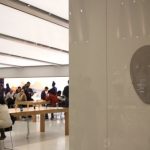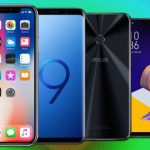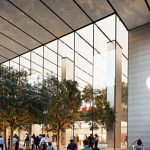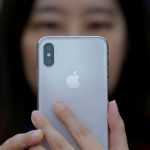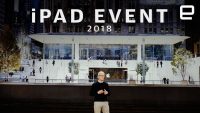4 Clues About Apple’s Future Hidden In Its New San Francisco Store
At a press event this morning in downtown San Francisco, Angela Ahrendts introduced Apple’s new Union Square store.
The outlet, which has been in the works for over two years, is shimmery and new in the way we have come to expect from Apple stores: Huge glass doors, open areas, simple and vibrant colors. But this one is truly brand new. It’s the kind of huge leap forward Steve Jobs loved to see—even if this one remakes the retail blueprint he and Ron Johnson established over a decade ago. Apple is one of those companies that believes that everything that touches the consumer represents the company. So the design of this new store isn’t just a design: It’s a statement about the philosophy and ambitions of Tim Cook’s Apple.
First, the details. You can see pictures of the store all over Twitter. The Genius Bar has been transformed into an environmental workspace under, as the Apple press release puts it, a “comfortable canopy of local trees.” There’s a boardroom where a team of business geniuses will school local entrepreneurs and shop owners on the ways Apple products can improve efficiency. There’s an agora that will function as something of an education center and help Apple aficionados better exploit their creative passions. What Apple calls “The Plaza” will serve as a 24-hour-a-day gathering place, home to a variety of events, including concerts and lectures.
Here are four things we can glean from the Union Square Store:
Innovation is hardly dead at Apple: Critics carp that Apple hasn’t introduced anything breathtakingly new since the iPad. Fair enough—many still consider the Watch a disappointment.
But the critics are missing a central fact about Apple: It is one of the few companies that continues to relentlessly innovate on existing, highly successful lines of business. Apple’s retail stores are the most successful in the world. Many CEOs would say, Why mess around with that? Not Tim Cook. He brought in Angela Ahrendts, who made more money than he did last year, and gave her the time and space to give the stores a serious makeover for the modern Apple.
Apple is an experience: Apple always says it is not just selling devices; it is selling an “experience.” That experience has grown bigger and bigger over the years. In Steve Jobs’s’ heyday, the experience was first a device with seamless software and hardware, both made by Apple. (Other computer manufacturers wrapped their hardware around Microsoft’s operating system.) Then the experience became the collection of those devices—iPad, iPhone, Mac—wirelessly connected to each other and the world.
Under Tim Cook, the “Apple experience” is bigger than ever. It extends, of course, to the world of connected apps. But it also extends to the world of sensors collecting information from your light bulb and your thermostat; to those people in India and Poland who are right this minute enjoying your cat video on different-sized iPhones; to the doctors connecting with patients via HealthKit applications; and to the Apple TV in your living room. In the future, that “experience” may well reach into cars, and a host of other sensor-equipped devices.
This new store is almost a transparent thing—you can see everything going on around you in Union Square, and the “Plaza” is as much a public space as an Apple space. There’s a metaphorical thing going on here—the store suggests that the Apple experience is unlimited, reaching into all aspects of public life. In that way, it’s a store that suggests Apple’s unlimited ambition.
Apple wants to be seen as a moral company: “We are not just evolving our store design,” said Ahrendts, “but its purpose and greater role in the community.” That’s a statement that’s right in keeping with Tim Cook’s desire to have Apple be a moral company, a company that does good for its customers.
Steve Jobs didn’t play this game: He believed that making great devices was a great service, and he left it at that. Cook consistently presents Apple as a company with a public responsibility. Sometimes he does so by weighing in on issues like encryption, or by having Apple be a vocal supporter of LGBTQ rights. In this case, he’s doing it by presenting the Apple store as a friendly community hub, and by building a store that is fueled entirely by renewable energy.
Apple respects business: It’s not anything that’s apparent to most of us consumers, but over the last few years Apple has been making more and more forays into selling its experience to businesses. In partnerships with the likes of SAP and IBM, Apple is trying to help businesses make better use of the hundreds or thousands of Apple devices their employees rely on.
For years, Apple was the outsider, the one that didn’t adhere to the PC/Windows standard that made everything simple for other companies. But the ubiquity of the iPhone and its other products forced businesses to adapt—no longer could they dictate that everyone in the company use, say, Blackberrys. Having wormed its way into corporate networks via all those happy consumers who work for those corporations, Apple is now taking the direct approach: selling straight to companies and helping them coordinate a slew of applications and devices across their network.
Sure, Apple does that in order to sell more of its high-margin devices. But helping corporations devise “solutions” in “the boardroom” makes the company sound almost like a consulting firm. Who knows? Maybe the Apple universe will expand in ways we never imagined.
The history of Apple in under 3 minutes
Fast Company , Read Full Story
(11)

